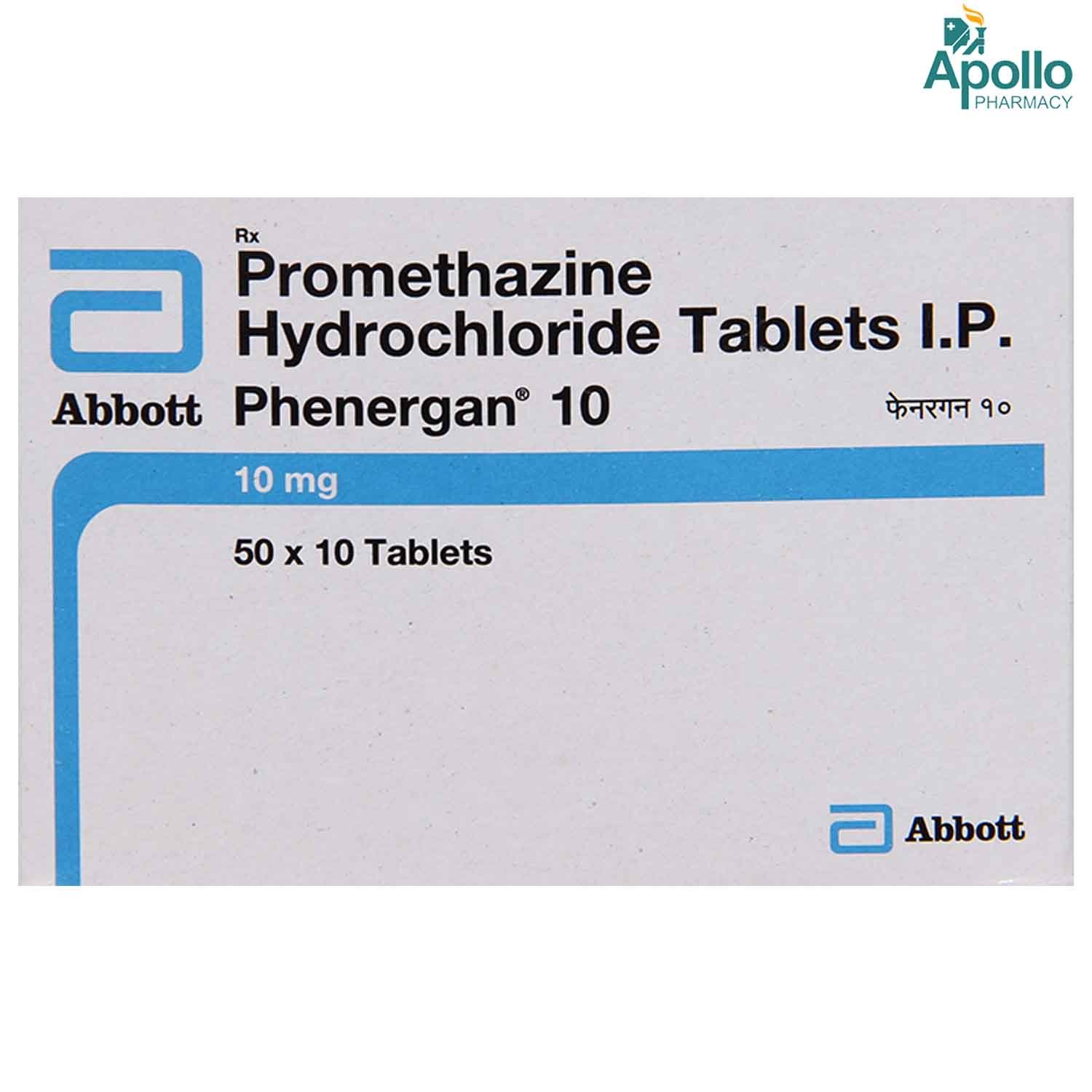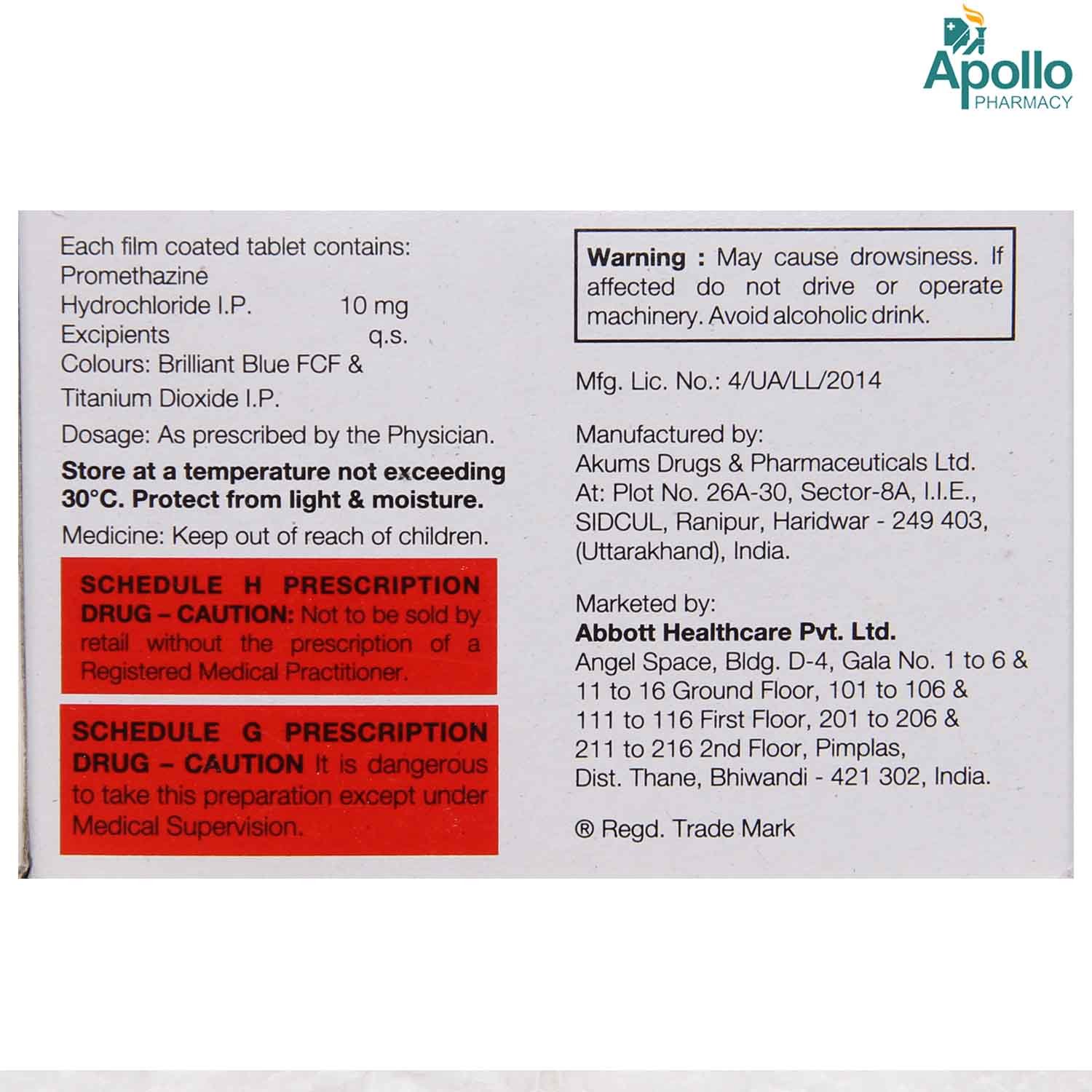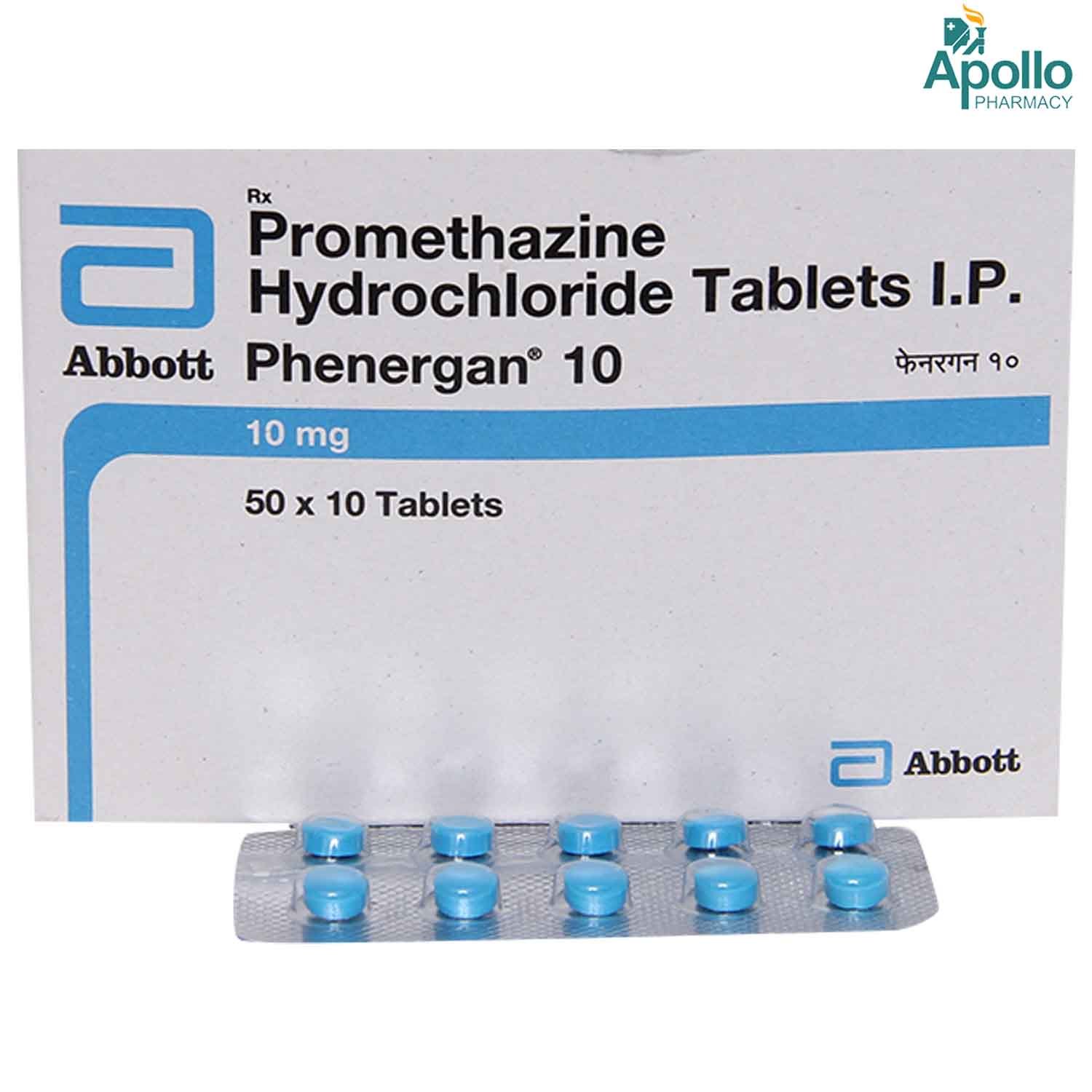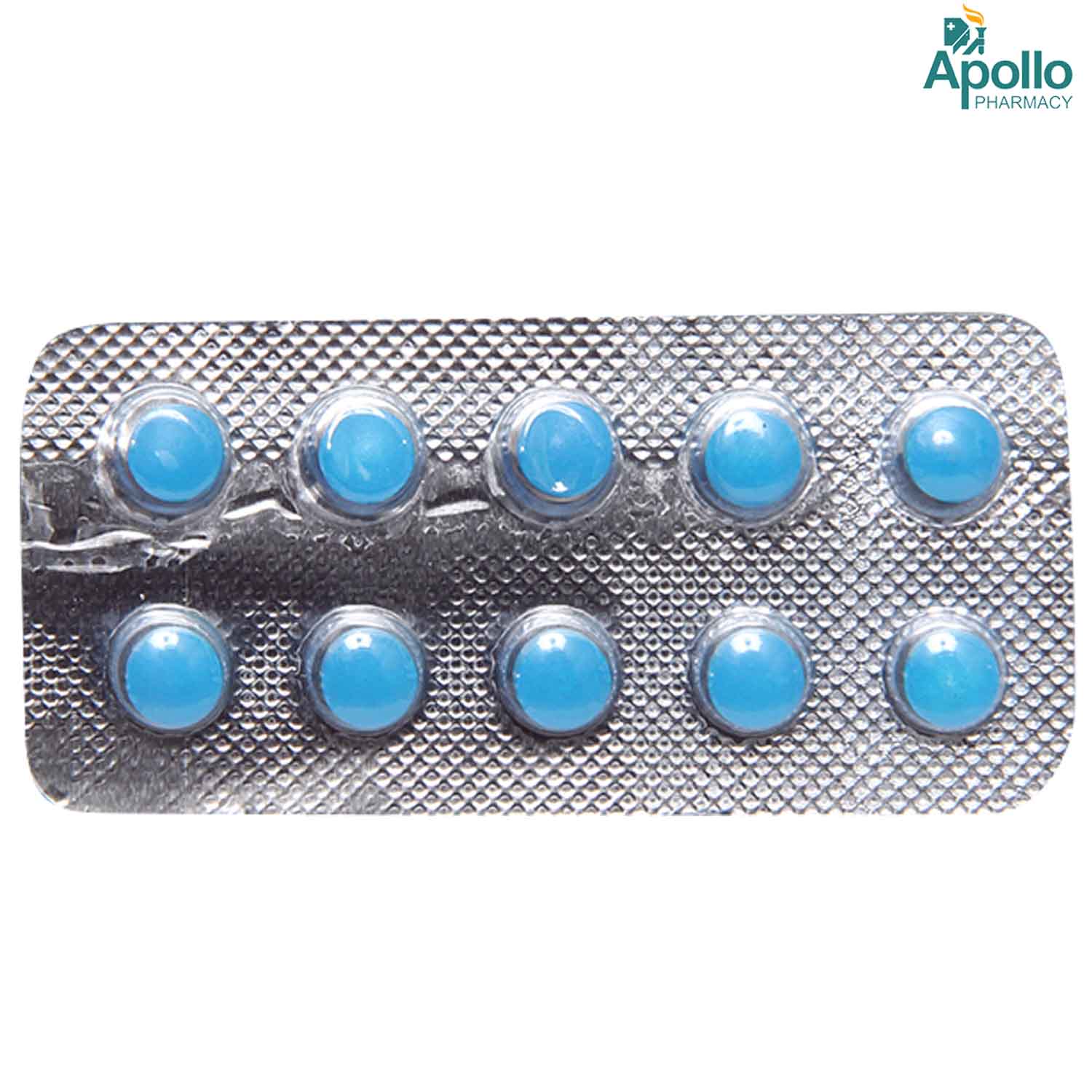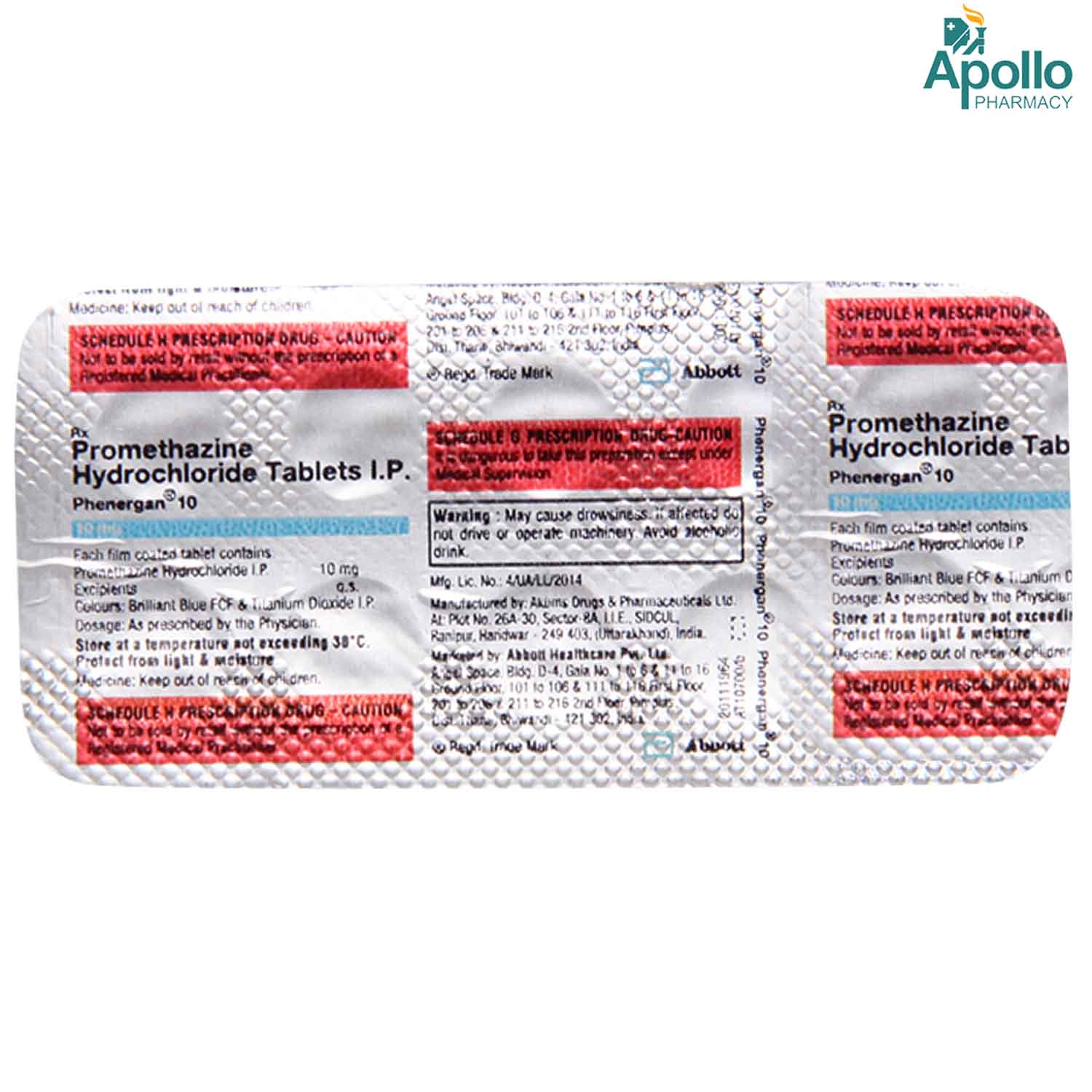PHENERGAN 10MG TABLET
MRP ₹19.5
(Inclusive of all Taxes)
₹2.9 Cashback (15%)
know your delivery time
Provide Delivery Location
Composition :
Manufacturer/Marketer :
Consume Type :
Expires on or after :
Return Policy :

Secure Payment

Trusted by 8 Crore Indians

Genuine Products
Therapeutic Class
Country of origin
Manufacturer/Marketer address
FAQs
Disclaimer
Alcohol
Safe if prescribed
PHENERGAN 10MG TABLET increases the drowsiness when alcohol is consumed. So, do not take alcohol while using PHENERGAN 10MG TABLET.
Pregnancy
Consult your doctor
PHENERGAN 10MG TABLET is a category C medicine. It may cause toxic effects to the fetus. It should be used in pregnant women only if needed. Please consult your doctor. Your doctor will weigh the benefits and any potential risks before prescribing it to you.
Breast Feeding
Consult your doctor
PHENERGAN 10MG TABLET may pass into breast milk and cause harmful effects to the baby. So, do not use PHENERGAN 10MG TABLET in breastfeeding mothers unless prescribed by your doctor.
Driving
Safe if prescribed
PHENERGAN 10MG TABLET may cause drowsiness and dizziness. So, avoid driving or operating heavy machinery while using PHENERGAN 10MG TABLET.
Liver
Consult your doctor
PHENERGAN 10MG TABLET should be used with caution in patients with liver diseases. Your doctor will weigh the benefits and any potential risks before prescribing it to you. Please consult your doctor.
Kidney
Consult your doctor
PHENERGAN 10MG TABLET should be used with caution in patients with kidney diseases. Your doctor will weigh the benefits and any potential risks before prescribing it to you. Please consult your doctor.
Children
Safe if prescribed
PHENERGAN 10MG TABLET is not recommended for use in children below 5 years of age. For children above 5 years of age, dose adjustments may be necessary if prescribed by a child specialist.
About PHENERGAN 10MG TABLET
PHENERGAN 10MG TABLET belongs to the class of medications called ‘antihistamines’ used in the treatment of allergic reactions, insomnia, and travel sickness. Allergy or hypersensitivity is an immune system response to foreign elements typically not harmful to your body. Insomnia is a sleep disorder characterized by difficulty falling or staying asleep. Travel sickness is an illness caused by motion during travel characterized by nausea and vomiting.
PHENERGAN 10MG TABLET contains ‘promethazine’, which acts as an antihistamine. It blocks the action of histamines (chemicals causing allergic symptoms) and reduces the allergic reaction. It also acts on the brain directly and produces a calming and anti-nausea effect.
Take PHENERGAN 10MG TABLET as prescribed. The dose and duration of this medicine are advised by your doctor. Common side effects of PHENERGAN 10MG TABLET are dry mouth, blurred vision, drowsiness, dizziness, headache, tiredness, disorientation, having nightmares, confusion, restlessness, loss of appetite, indigestion, low blood pressure (hypotension), photosensitivity (redness or rashes on sun-exposed skin) and an uncontrollable urge to move the legs (Restless Legs Syndrome). If these side effects persist or worsen, please consult a doctor.
Do not take PHENERGAN 10MG TABLET if you are allergic to promethazine or any contents of it. PHENERGAN 10MG TABLET should not be given to children below 2 years of age due to the risk of potential respiratory depression (slow and ineffective breathing). PHENERGAN 10MG TABLET may cause skin photosensitivity (rashes and redness on sun-exposed skin). So, avoid prolonged exposure to sunlight. PHENERGAN 10MG TABLET may cause dizziness, so you should not drive or operate heavy machinery. Inform your doctor if you have sleep apnea (sleeping disorder) or chronic obstructive pulmonary disease (COPD) (a lung disease) as this medicine may cause respiratory depression or excessive drowsiness. Do not consume alcohol while taking this medicine. PHENERGAN 10MG TABLET tablets contain lactose, so inform your doctor if you have an intolerance to sugars.
Uses of PHENERGAN 10MG TABLET
Medicinal Benefits Mweb
Key Benefits
PHENERGAN 10MG TABLET contains ‘promethazine’ which belongs to the class of ‘phenothiazines’. It is an antihistamine and blocks the action of histamines (chemicals causing allergic symptoms). It can effectively treat allergic symptoms such as itching, watery eyes, hives, runny nose and sneezing. It also acts on the brain directly and produces a calming and anti-nausea effect. For short-term use, it is used in the treatment of insomnia. It can treat symptoms such as feeling sick (nausea) and fall sick (vomiting) occurring due to travel or motion sickness.
Directions for Use
Side Effects of PHENERGAN 10MG TABLET
- Dry mouth
- Blurred vision
- Drowsiness
- Dizziness
- Headache
- Tiredness
- Disorientation
- Having nightmares
- Confusion
- Restlessness
- Loss of appetite (anorexia)
- Indigestion (dyspepsia)
- Low blood pressure (hypotension)
- Photosensitivity (redness or rashes on sun-exposed skin)
- Uncontrollable urge to move the legs (Restless Legs Syndrome)
Drug Warnings
Do not take PHENERGAN 10MG TABLET if you are allergic to Promethazine or any other contents of it. Before taking PHENERGAN 10MG TABLET, please tell your doctor if you are using any antidepressants as taking these two medicines together can cause severe drowsiness. This medicine should not be given to children below 5 years of age and patients who are unconscious or have severe drowsiness, dizziness or headache. Inform your doctor if you have difficulty breathing, asthma or bronchitis (lung problems), epilepsy (fits), serious heart problems, liver or kidney problems, a stomach blockage, hearing problems, increased pressure in the eye (glaucoma) and Reye’s Syndrome (swelling in the liver and brain in children). Also, inform your doctor if you are pregnant or breastfeeding. This medicine causes dizziness and drowsiness. So, limit alcohol intake and refrain from activities that require you to stay mentally alert. Avoid prolonged exposure to sunlight or the use of sun lamps as it may cause photosensitivity (rashes on sun-exposed skin).
Drug-Drug Interactions
Drug-Drug Interactions
Login/Sign Up
Taking Phenergan 10mg Tablet with pimozide can increase the risk of an irregular heart rhythm that may be serious
How to manage the interaction:
Taking Phenergan 10mg Tablet with pimozide is not recommended, as it can cause interaction. They can be taken together if advised by your doctor. However, contact your doctor if you experience sudden dizziness, lightheadedness, fainting, or shortness of breath. Do not stop taking any medications without consulting a doctor.
When Ropinirole is taken with Phenergan 10mg Tablet, it may reduce the effectiveness of ropinirole.
How to manage the interaction:
Taking Ropinirole with Phenergan 10mg Tablet is not recommended as it can possibly result in an interaction, it can be taken if your doctor has prescribed it. However, consult the doctor immediately if you experience symptoms such as drowsiness, dizziness, and lightheadedness. Do not stop using any medications without consulting a doctor.
Using Halofantrine together with Phenergan 10mg Tablet may raise the chance of an irregular heart rhythm.
How to manage the interaction:
Taking Phenergan 10mg Tablet with Halofantrine is not recommended, please consult your doctor before taking it. They can be taken if your doctor prescribes it. Do not stop taking any medication without consulting your doctor.
Taking Phenergan 10mg Tablet with Thioridazine can increases the risk and severity of side effects such as extreme drowsiness, confusion, agitation, vomiting, blurred vision, feeling hot or cold, sweating, muscle stiffness, fainting, seizure (fits).
How to manage the interaction:
Taking Phenergan 10mg Tablet with Thioridazine is not recommended. Please consult your doctor before taking it. They can be taken together if advised by your doctor. However, contact your doctor if you experience uncontrollable movements of the mouth, tongue, cheeks, jaw, arms, or legs, fever, muscle rigidity, irregular pulse, or fast or irregular heartbeats. Do not stop taking any medications without consulting a doctor.
Phenergan 10mg Tablet can increase the blood levels of Cisapride, which increases the risk of side effects.
How to manage the interaction:
Taking Phenergan 10mg Tablet with Cisapride is not recommended. Please consult your doctor before taking it. They can be taken together if advised by your doctor. However, contact your doctor if you experience any symptoms. Do not stop taking any medications without consulting a doctor.
Using Mesoridazine together with Phenergan 10mg Tablet may raise the chance of an irregular heart rhythm.
How to manage the interaction:
Taking Mesoridazine with Phenergan 10mg Tablet is not recommended, please consult your doctor before taking it. They can be taken if your doctor prescribes them. Do not stop taking any medication without consulting your doctor.
Coadministration of Metoclopramide with Phenergan 10mg Tablet can increase the risk of side effects like uncontrolled movement disorder.
How to manage the interaction:
Taking Phenergan 10mg Tablet with Metoclopramide is generally avoided as it can possibly result in an interaction. They can be taken together However, consult a doctor if you experience puckering, frowning or scowling, tongue thrusting, teeth clenching, jaw twitching, blinking, eye-rolling, shaking or jerking of arms and legs, tremor, jitteriness, restlessness, pacing, and foot tapping. Do not stop taking any medications without consulting a doctor.
Taking Phenergan 10mg Tablet with Potassium chloride can increase the risk of stomach ulcers.
How to manage the interaction:
Taking Phenergan 10mg Tablet with Potassium chloride is not recommended, as it can lead to an interaction, they can be taken if a doctor has prescribed it. However, if you experience severe stomach pain, bloating, sudden lightheadedness or dizziness, nausea, vomiting (especially with blood), decreased hunger, dark, tarry stools, consult the doctor immediately.
Coadministration of Phenergan 10mg Tablet and dronedarone can increase the risk of an irregular heart rhythm that may be serious.
How to manage the interaction:
Taking Phenergan 10mg Tablet with Dronedarone is not recommended, please consult your doctor before taking it. They can be taken together if advised by your doctor. However, contact your doctor if you experience sudden dizziness, lightheadedness, fainting, shortness of breath. Do not stop taking any medications without consulting a doctor.
Co-administration of Phenergan 10mg Tablet with Ziprasidone can increase the risk of irregular heart rhythm.
How to manage the interaction:
Taking Phenergan 10mg Tablet with Ziprasidone together can possibly result in an interaction, they can be taken if a doctor has advised it. However, consult a doctor immediately if you experience dizziness, lightheadedness, fainting, shortness of breath, or heart palpitations. Do not discontinue any medications without consulting a doctor.
Drug-Food Interactions
Drug-Food Interactions
Login/Sign Up
Drug-Diseases Interactions
Drug-Diseases Interactions
Login/Sign Up
Drug-Drug Interactions Checker List
- DIAZEPAM
- ZOLPIDEM
- ASPIRIN
Habit Forming
Special Advise
- PHENERGAN 10MG TABLET makes your skin sensitive, So, try to avoid going into sun for long time, avoid going under sun lamps, use effective sunblock and wear protective clothing while going out.
- Inform your doctor before undergoing any allergy test that you are using PHENERGAN 10MG TABLET.
Diet & Lifestyle Advise
Allergy:
- Stay hydrated as it is vital for those with a cough or cold. Drinking liquids at room temperature can alleviate cough, runny nose and sneezing.
- Avoid stress as the immune system is affected by stress and raises the risk of being sick. An individual can exercise regularly, meditate, do deep breathing, and try progressive muscle relaxation techniques to relieve stress.
- Stay fit and safe and try to sleep 7-9 hours each night.
- Avoid contact with known allergens (allergy-causing agents) such as pollen, dust, etc. Certain food items are known to cause allergies to you.
- Maintain personal hygiene and keep your surroundings clean.
Insomnia:
- Maintain a sleep schedule. Wake up at the same time every day, including on weekends. Make a comfortable sleeping environment.
- Stay active.
- Avoid naps.
- Do not eat large meals before going to bed.
- Limit alcohol intake and quit smoking.
Travel sickness:
- Avoid spicy, greasy and acidic foods before traveling. Opt for cereals, apples, bananas or bread.
- Reduce speed if required.
- Position yourself where motion is least, like in the front in a car, centre in a boat or ship and over the wings in an airplane.
- Breathe fresh air if possible by opening the window.
- Avoid alcohol 24 hours before travel and during the travel.
All Substitutes & Brand Comparisons
RX
Out of StockNot for online saleRegan 10 mg Tablet 10's
Sun Pharmaceutical Industries Ltd
₹10.74
(₹0.97 per unit)
44% CHEAPERRX
Not for online salePrometh 10 mg Tablet 10's
D D Pharmaceuticals Pvt Ltd
₹13.5
(₹1.22 per unit)
30% CHEAPER

Have a query?

